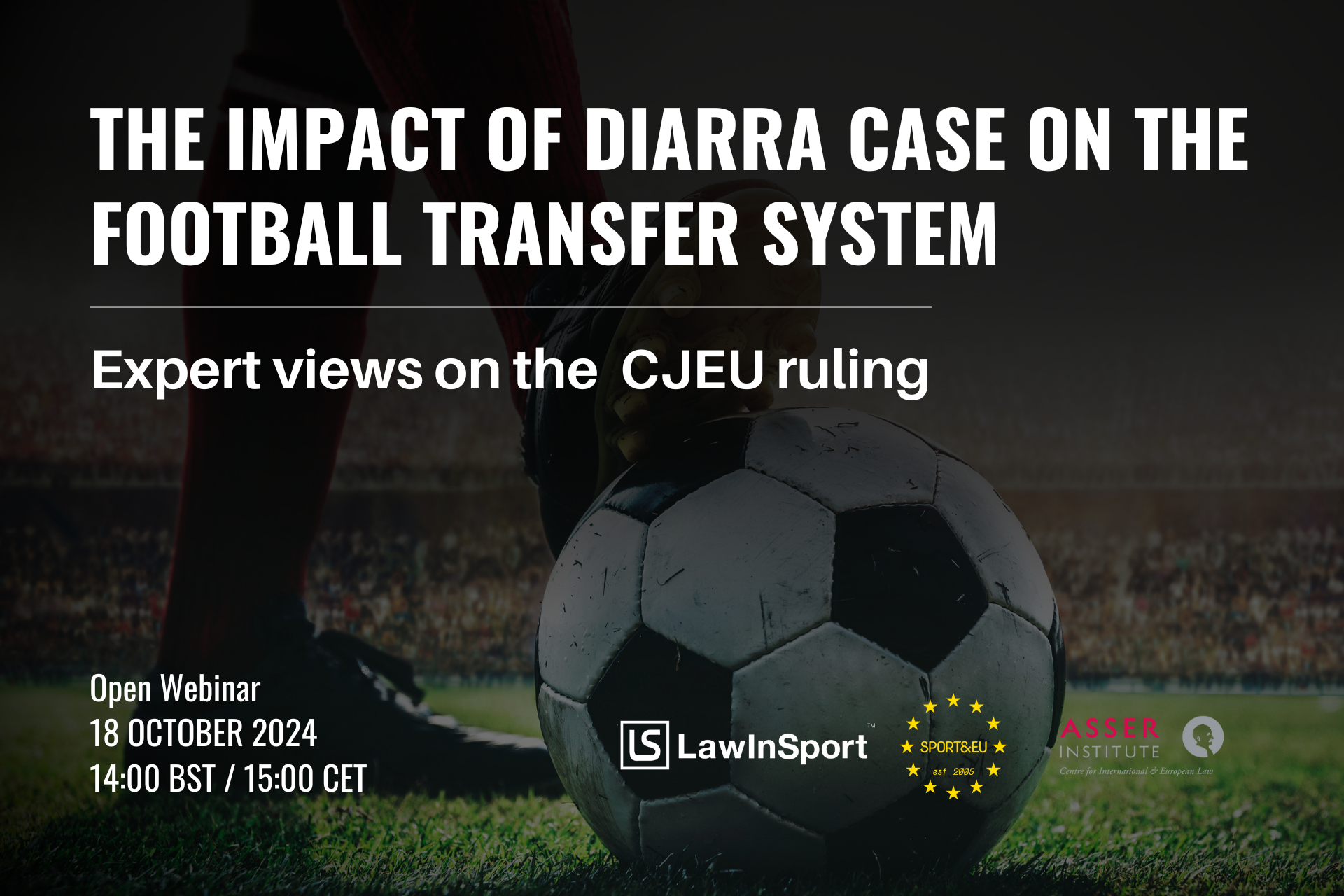On 4 October, the Court of Justice of the European Union shook the world of football with its Diarra ruling. The decision questions the compatibility of a key provision of the FIFA Regulations on the Status and Transfer of Players (RSTP) with European Union internal market law. The RSTP, and in particular its article 17, are the bedrock of football’s transfer ‘market’ and regulate the conditions for the transnational movement of players between clubs. In 2023, based on FIFA’s numbers, 21 801 players were transferred internationally (of which 3279 with a fee) for transfer fees amounting to USD 9.63 bn. In short, this is a market that affects a considerable number of players and is linked with the movement of large sums of money between clubs and other actors (such as intermediaries).
Register HERE
Join us on 20 November from 16:00 to 18:00 CET to take stock of the ruling's impact and discuss the steps ahead in a free Zoom-In webinar in which there will be time for a Q&A session with the speakers. The ruling has already been much commented on (see here, here, here, and here), and this zoom-in webinar will be an opportunity for participants to engage with two experts on the economic and legal intricacies of the regulation of labour relations in football. We will mostly focus on the aftermath of the judgment and the question, 'what comes next?'
Moderator: Marjolaine Viret (Université de Lausanne)
Speakers:
Register HERE
The Court of Justice of the European Union has recently handed down its judgement in the Lassana Diarra case (C-650/22 FIFA v. BZ).
Given the importance of this case to the sports industry, LawInSport, the Asser Instituut and the Association for the Study of Sport and the EU (Sport & EU) are hosting a joint webinar to bring together experts to unpack and provide clarity on the complex legal, regulatory & commercial issues stemming from this case. This free webinar will be hosted from 14:00 UK time (15:00 CET) on 18 October 2024.
Register HERE
Speakers
Our expert speakers come from academia, law and sport. Our confirmed speakers are:
- Mario Flores Chemor, Head of Sports Legal, European Club Association
- Sinziana Ianc, Antitrust & Foreign Investment Managing Associate, Linklaters
- Carol Couse, Partner, Mills & Reeve
- Pieter Paepe, Partner, Edson Legal (represented FIFPRO & UNFP - French player’s association in this case)
- Dr. Andrea Cattaneo, Senior Lecturer in Law, Edge Hill University
- Dr. Antoine Duval, Senior Researcher, T.M.C. Asser Instituut
- Sean Cottrell, CEO, LawInSport (moderator)
Register HERE

Editor’s note: This report compiles all relevant news, events and
materials on International and European Sports Law based on the daily coverage
provided on our twitter feed @Sportslaw_asser. You are
invited to complete this survey via the comments section below, feel free to
add links to important cases, documents and articles we might have
overlooked.
The Headlines
The Diarra
ruling of the Tribunal of Charleroi
On 19 January 2017, the Hainaut Commercial Tribunal –
Charleroi rendered its decision on the lawsuit filed by the football player
Lassana Diarra against FIFA and the Belgian FA (URBSFA) for damages caused by
not being able to exercise the status of a professional football player during
the entire 2014/2015 season. The lawsuit is linked to the decision, rendered by
the FIFA Dispute Resolution Chamber (DRC) on April 2015, to support Lokomotiv’s
decision to terminate the player’s contract and to order Diarra to pay Lokomotiv
the amount of EUR 10,500,000 for having breached his contract. According to the
plaintiff, Diarra’s opportunity to be recruited by Sporting Charleroi was
denied due to the club being potentially considered jointly liable for Diarra’s
compensation pursuant to Article 17 (2) RSTP. The Belgian court held strongly
that “when the contract is terminated by the club, the player must have the
possibility to sign a new contract with a new employer, without restrictions to
his free movement”. This case highlighted, once again, the need to read
the RSTP in the light of EU law. Moreover, the decision is laying further
ground for broader challenges to the RSTP on the basis of EU law (for a deeper
insight into the Diarra ruling, see the recent blog written by our senior researcher
Antoine Duval) More...
Yesterday the sports law world was
buzzing due to the Diarra decision of
the Tribunal de Commerce du Hainaut (the Tribunal) based in Charleroi, Belgium.
Newspapers were lining up (here, here and here) to spread the
carefully crafted announcement of the new triumph of Jean-Louis Dupont over his
favourite nemesis: the transfer system. Furthermore, I was lucky enough to
receive on this same night a copy of the French text of the judgment. My first
reaction while reading quickly through the ruling, was ‘OMG he did it again’!
“He” meaning Belgian lawyer Jean-Louis Dupont, who after a string of defeats in
his long shot challenge against FIFA’s TPO ban or UEFA’s FFP (see here and here), had [at least
I believed after rushing carelessly through the judgment] manufactured a new
“it”: a Bosman. Yet, after carefully re-reading the judgment, it
became quickly clear to me that this was rather a new Mutu (in the sense of the latest CAS award in the ‘Mutu
saga’, which I have extensively analysed on this blog and in a recent commentary for the new Yearbook of International Sports Arbitration) coupled with some reflections reminding a bit (but
not really as will be explicated below) the Pechstein
case.
In this blog, I will retrace briefly
the story behind the case and then analyse the decision of the Belgium court.
In doing so, I will focus on its reasoning regarding its jurisdiction and the
compatibility of article 17(2) RSTP with EU law.More...